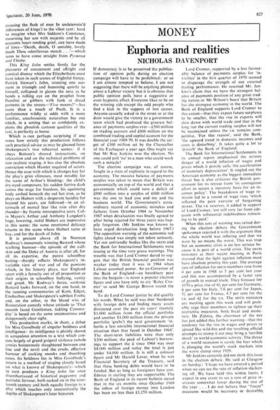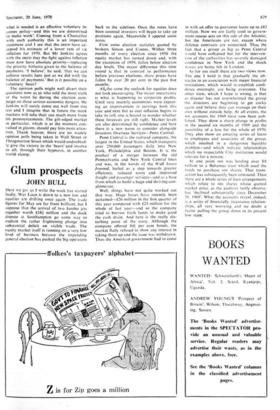MONEY Euphoria and realities
NICHOLAS DAVENPORT
If democracy is to be preserved the publica- tion of opinion polls during an election campaign will have to be prohibited: or so I am almost tempted to believe. I am not suggesting that there will be anything phoney about a Labour victory but it is obvious that public opinion polls have a suggestive or even hypnotic effect. Everyone likes to be on the winning side except the odd people who find a kick in the support of lost causes. Anyone casually asked in the street or at the door would give the victory to a government team which had produced the greatest bal- ance of payments surplus ever—£560 million on trading account and £606 million on the
combined trading and capital account for the financial year 1969-70. It was double the tar-
get of £300 million set by the Chancellor of the Exchequer a year ago. One might say that Mr Roy Jenkins won the election. No one could poll `no' to a man who could work such a miracle!
The election campaign was, of course, fought in a state of euphoria in regard to the economy. The massive balance of payments surplus was taken to mean that Britain was economically on top of the world and that a government which could turn a deficit of £800 million into a surplus of £600 million was the one to lead you and me and the business world. The Government's extra- ordinary record of economic mistakes and failures from October 1964 to November 1967 when devaluation was finally agreed to after being rejected for three years was hap- pily forgotten. (Mr Jenkins was known to have urged devaluation long before 1967.) The opposition warning of the economic red lights ahead was simply not taken seriously. Yet not unfriendly bodies like the OECD and the Bank for International Settlements were issuing at the time very grave warnings. The trouble was that Lord Cromer dared to sug- gest that the British financial position was weaker today than it was in 1964 when Labour assumed power. An ex-Governor of the Bank of England—an hereditary peer into the bargain—is never a popular election figure and you have only to cry `Roley Cro- mer' to send Mr George Brown round the bend.
To do Lord Cromer justice he did qualify his words. What he said was that 'burdened with foreign debt and finding many assets dissipated over the past six years' (namely $1.000 million from the official portfolio and another $1,000 million from the private portfolio 'grabs') the next government 'in- herits a less enviable international financial situation than that faced in October 1964'. The short-term liabilities were then only $200 million; the peak of Labour's borrow- ings to support the £ since 1964 was over $8.000 million and today the total is just under $4,000 million. It is still a colossal figure and Mr Harold Lever, when he was Financial Secretary of the Treasury, said that these banking debts would have to be funded. But as long as foreigners have con- fidence in sterling they are supportable. The Bank of England in its recent bulletin stated that in the six months since October 1969 the inflow of foreign money into London has been no less than £1,350 million. Lord Cromer, supported by a less favour. able balance of payments surplus for 'in-
visibles' in the first quarter of 1970 seemed to disparage the strength of our external trading performance. He resented Mr. Jen- kins's claim that we have the strongest bal- ance of payments position of any great trad- ing nation or Mr Wilson's boast that Britain has the strongest economy in the world. The Bank of England supports Lord Cromer to this extent—that they expect future surpluses to be smaller, that the rise in exports will slow down with world trade and that in the long run the current trading surplus will not be maintained unless the UK remains com- petitive. 'For this reason', said the Bank, `the upward trend in domestic incomes and costs is disturbing'. It takes quite a lot to 'disturb' the Bank of England.
The Bank for International Settlements in its annual report emphasised the serious danger of a world inflation of wages and prices which it prosily calls 'the acceleration of monetary depreciation'. It singled out the American economy as the biggest immediate threat but it also criticises the British gov- ernment for its retreat from 'its courageous effort to secure a statutory basis for an in- comes policy'. The breakdown of wage re- straint led to a round of wage rises 'which reflected the pure exercise of bargaining power. The UK reserves, it added in support of Lord Cromer, 'are still very far from ade- quate with substantial indebtedness remain- ing to be paid.'
When this sort of warning was raised dur- ing the election debate the Government spokesman rejected it with the argument that the whole world was inflating and that we were by no means the worst. This was true but an economic crisis is no less serious be- cause it is part of a world crisis. The OECD ministers at their recent meeting in Paris stressed that the fight against inflation must have absolute priority this year. The average rate of inflation for OECD members rose from 4 per cent in 1968 to 5 per cent last year and this was accompanied by a faster rate of growth in mutual trade. They forecast for 1970 a price rise of 64 per cent for Germany, 6 per cent for Italy, 5.6 per cent for Japan, 54 per cent for France, 4.7 per cent for the Lac and 4-1- for the us. The OECD ministers are meeting again this week and will prob- ably urge their members to tighten up their restrictive measures, both fiscal and mone- tary. Dr ZijIstra, the chairman of the BIS has just added this further warning—that the tendency for the rise in wages and prices to spread like wild-fire and the resulting official attempts to stamp it out may bring a 'terrible shock' to world economic activity. The threat of a world recession is surely the fear which is plunging the world's stock markets into the worst slump since 1929.
Mr Jenkins certainly did not shirk this issue in the election debate. He said at Glasgow on Sunday: 'I hope we have entered a period when we can see the rate of inflation slacken- ing off. We have held this within limits. I expect in any event to see a rate of price in- creases somewhat lower during the rest of the year . . . I do not believe that "freeze" measures would be necessary or desirable; what is needed is an effective voluntary in- comes policy—and this we are determined to make work'. Coming from a-Chancellor with such authority this is an important statement and I see that the OECD have ac- cepted his estimate of a lower rate of UK inflation for 1970. But Mr Jenkins agrees with the OECD that the fight against inflation must now have absolute priority—replacing the priority hitherto given to the balance of payments. 'I believe', he said, 'that we can achieve results here just as we did with the balance of payments.' But is it possible on a voluntary basis?
The opinion polls might well divert their questions now as to who told the most truth or the worst lie during the election cam- paign on these serious economic dangers. Mr Jenkins will surely come out well from this test and I imagine that in future the stock markets will take their cue much more from his pronouncements. The gilt-edged market in particular, which is at the moment con- vulsed in gloom, should pay him more atten- tion. Thank heaven, there are no weekly opinion polls being taken in Wall Street or Throgmorton Street which would undoubted. ly give the victory to the 'bears' and involve us all, through their hypnosis, in another world slump.



































 Previous page
Previous page